Federation University: Taxation Law Assignment on Sharing Economy
VerifiedAdded on 2022/12/27
|11
|2848
|65
Essay
AI Summary
This essay analyzes the taxation law implications of the sharing economy, focusing on platforms like Uber and Airbnb. It delves into the challenges the Australian Taxation Office (ATO) faces in ensuring tax compliance within this sector, including issues of underreporting and lack of awareness among gig economy workers. The essay examines current arrangements and the need for improved information gathering and transparency. It explores recommended ways to enhance tax obligations, such as platform reporting and reporting through financial institutions, emphasizing the importance of a light-touch supervisory approach and a level playing field for all operators. The essay concludes by highlighting the benefits of the sharing economy and the need for effective tax compliance strategies to ensure fairness and promote a sustainable economic environment. The essay also suggests specific measures such as reporting by sharing economy platforms and financial institutions to improve tax reporting obligations. The essay also emphasizes the need for data privacy in the sharing economy.
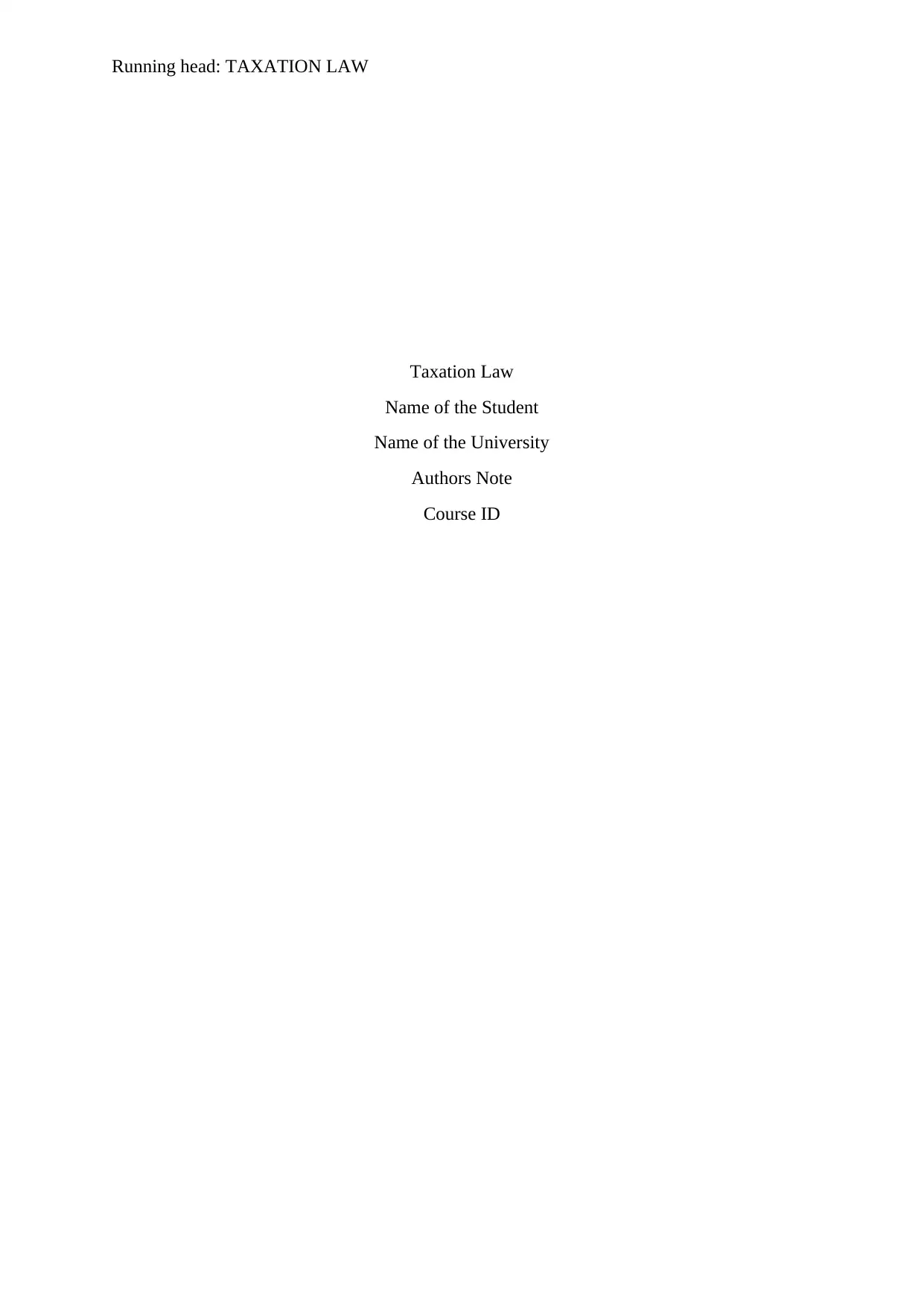
Running head: TAXATION LAW
Taxation Law
Name of the Student
Name of the University
Authors Note
Course ID
Taxation Law
Name of the Student
Name of the University
Authors Note
Course ID
Paraphrase This Document
Need a fresh take? Get an instant paraphrase of this document with our AI Paraphraser
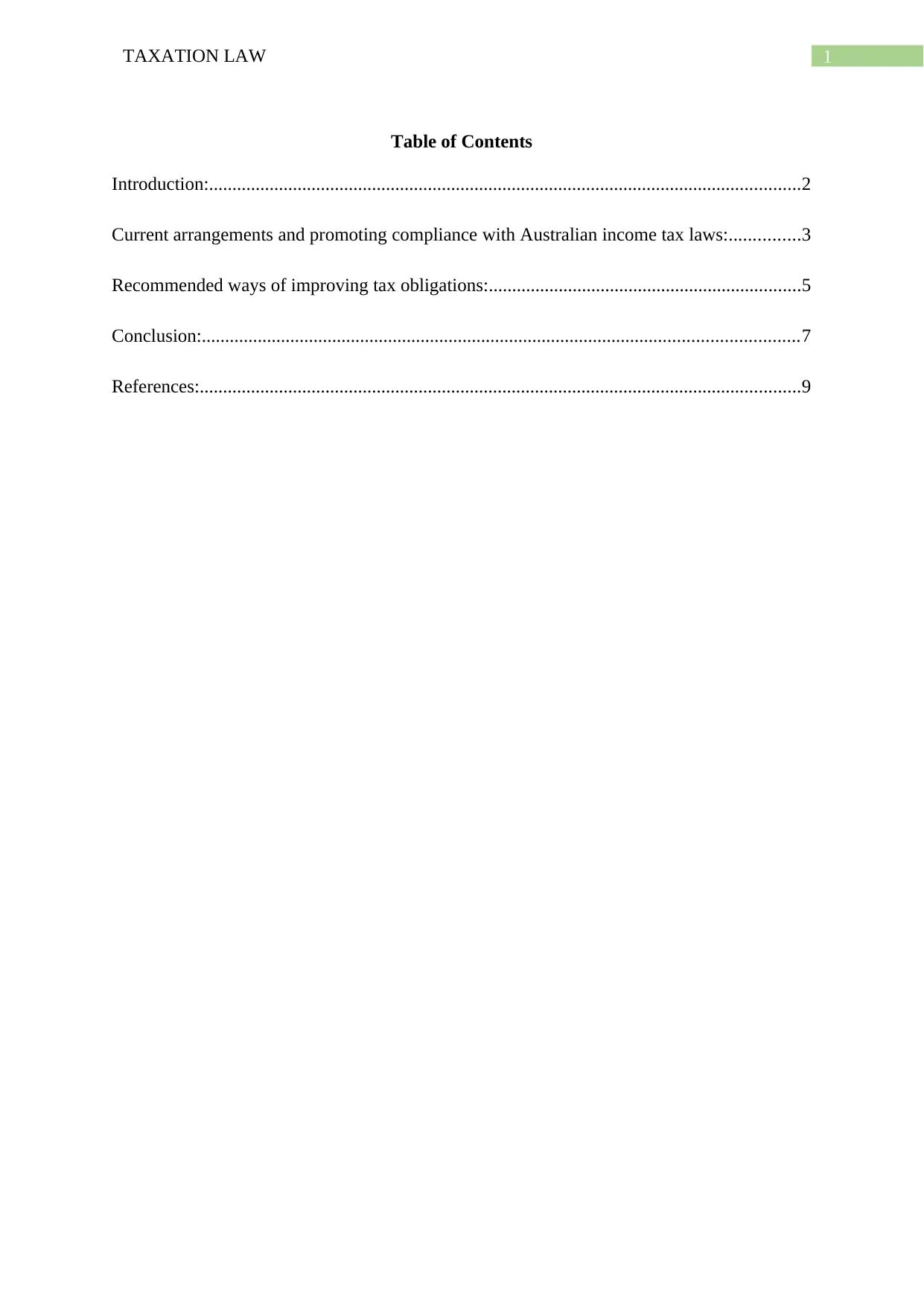
1TAXATION LAW
Table of Contents
Introduction:...............................................................................................................................2
Current arrangements and promoting compliance with Australian income tax laws:...............3
Recommended ways of improving tax obligations:...................................................................5
Conclusion:................................................................................................................................7
References:.................................................................................................................................9
Table of Contents
Introduction:...............................................................................................................................2
Current arrangements and promoting compliance with Australian income tax laws:...............3
Recommended ways of improving tax obligations:...................................................................5
Conclusion:................................................................................................................................7
References:.................................................................................................................................9
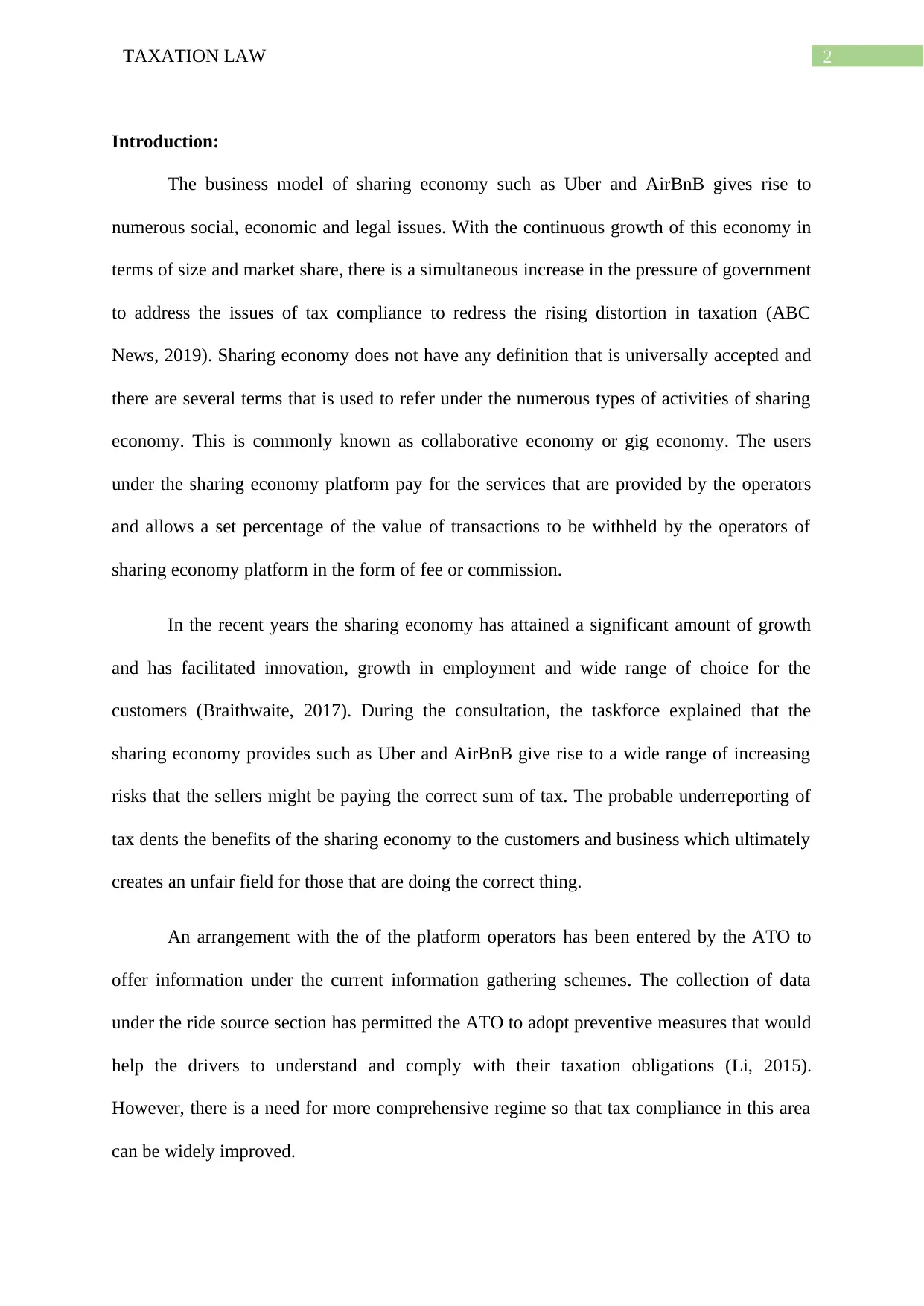
2TAXATION LAW
Introduction:
The business model of sharing economy such as Uber and AirBnB gives rise to
numerous social, economic and legal issues. With the continuous growth of this economy in
terms of size and market share, there is a simultaneous increase in the pressure of government
to address the issues of tax compliance to redress the rising distortion in taxation (ABC
News, 2019). Sharing economy does not have any definition that is universally accepted and
there are several terms that is used to refer under the numerous types of activities of sharing
economy. This is commonly known as collaborative economy or gig economy. The users
under the sharing economy platform pay for the services that are provided by the operators
and allows a set percentage of the value of transactions to be withheld by the operators of
sharing economy platform in the form of fee or commission.
In the recent years the sharing economy has attained a significant amount of growth
and has facilitated innovation, growth in employment and wide range of choice for the
customers (Braithwaite, 2017). During the consultation, the taskforce explained that the
sharing economy provides such as Uber and AirBnB give rise to a wide range of increasing
risks that the sellers might be paying the correct sum of tax. The probable underreporting of
tax dents the benefits of the sharing economy to the customers and business which ultimately
creates an unfair field for those that are doing the correct thing.
An arrangement with the of the platform operators has been entered by the ATO to
offer information under the current information gathering schemes. The collection of data
under the ride source section has permitted the ATO to adopt preventive measures that would
help the drivers to understand and comply with their taxation obligations (Li, 2015).
However, there is a need for more comprehensive regime so that tax compliance in this area
can be widely improved.
Introduction:
The business model of sharing economy such as Uber and AirBnB gives rise to
numerous social, economic and legal issues. With the continuous growth of this economy in
terms of size and market share, there is a simultaneous increase in the pressure of government
to address the issues of tax compliance to redress the rising distortion in taxation (ABC
News, 2019). Sharing economy does not have any definition that is universally accepted and
there are several terms that is used to refer under the numerous types of activities of sharing
economy. This is commonly known as collaborative economy or gig economy. The users
under the sharing economy platform pay for the services that are provided by the operators
and allows a set percentage of the value of transactions to be withheld by the operators of
sharing economy platform in the form of fee or commission.
In the recent years the sharing economy has attained a significant amount of growth
and has facilitated innovation, growth in employment and wide range of choice for the
customers (Braithwaite, 2017). During the consultation, the taskforce explained that the
sharing economy provides such as Uber and AirBnB give rise to a wide range of increasing
risks that the sellers might be paying the correct sum of tax. The probable underreporting of
tax dents the benefits of the sharing economy to the customers and business which ultimately
creates an unfair field for those that are doing the correct thing.
An arrangement with the of the platform operators has been entered by the ATO to
offer information under the current information gathering schemes. The collection of data
under the ride source section has permitted the ATO to adopt preventive measures that would
help the drivers to understand and comply with their taxation obligations (Li, 2015).
However, there is a need for more comprehensive regime so that tax compliance in this area
can be widely improved.
⊘ This is a preview!⊘
Do you want full access?
Subscribe today to unlock all pages.

Trusted by 1+ million students worldwide
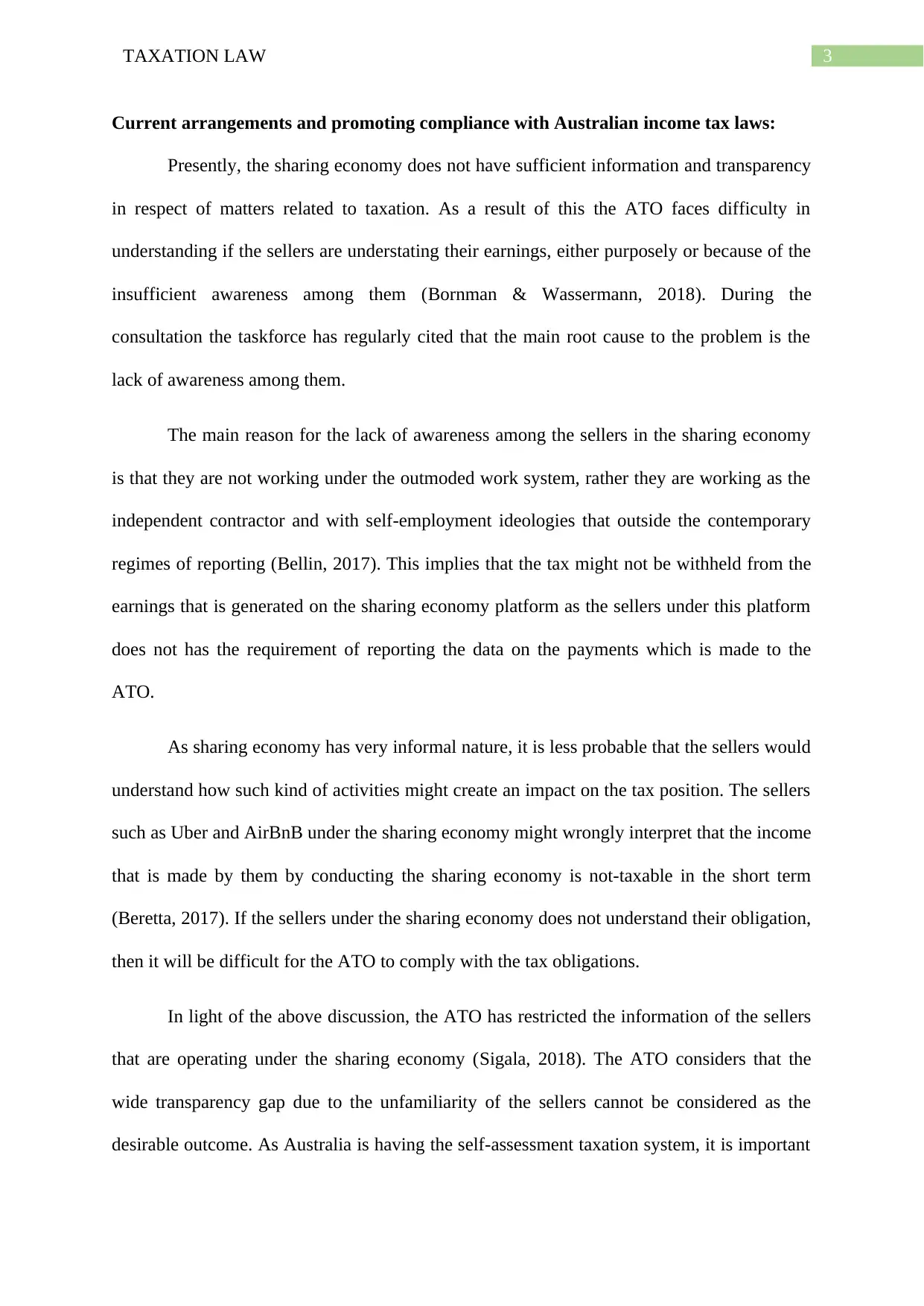
3TAXATION LAW
Current arrangements and promoting compliance with Australian income tax laws:
Presently, the sharing economy does not have sufficient information and transparency
in respect of matters related to taxation. As a result of this the ATO faces difficulty in
understanding if the sellers are understating their earnings, either purposely or because of the
insufficient awareness among them (Bornman & Wassermann, 2018). During the
consultation the taskforce has regularly cited that the main root cause to the problem is the
lack of awareness among them.
The main reason for the lack of awareness among the sellers in the sharing economy
is that they are not working under the outmoded work system, rather they are working as the
independent contractor and with self-employment ideologies that outside the contemporary
regimes of reporting (Bellin, 2017). This implies that the tax might not be withheld from the
earnings that is generated on the sharing economy platform as the sellers under this platform
does not has the requirement of reporting the data on the payments which is made to the
ATO.
As sharing economy has very informal nature, it is less probable that the sellers would
understand how such kind of activities might create an impact on the tax position. The sellers
such as Uber and AirBnB under the sharing economy might wrongly interpret that the income
that is made by them by conducting the sharing economy is not-taxable in the short term
(Beretta, 2017). If the sellers under the sharing economy does not understand their obligation,
then it will be difficult for the ATO to comply with the tax obligations.
In light of the above discussion, the ATO has restricted the information of the sellers
that are operating under the sharing economy (Sigala, 2018). The ATO considers that the
wide transparency gap due to the unfamiliarity of the sellers cannot be considered as the
desirable outcome. As Australia is having the self-assessment taxation system, it is important
Current arrangements and promoting compliance with Australian income tax laws:
Presently, the sharing economy does not have sufficient information and transparency
in respect of matters related to taxation. As a result of this the ATO faces difficulty in
understanding if the sellers are understating their earnings, either purposely or because of the
insufficient awareness among them (Bornman & Wassermann, 2018). During the
consultation the taskforce has regularly cited that the main root cause to the problem is the
lack of awareness among them.
The main reason for the lack of awareness among the sellers in the sharing economy
is that they are not working under the outmoded work system, rather they are working as the
independent contractor and with self-employment ideologies that outside the contemporary
regimes of reporting (Bellin, 2017). This implies that the tax might not be withheld from the
earnings that is generated on the sharing economy platform as the sellers under this platform
does not has the requirement of reporting the data on the payments which is made to the
ATO.
As sharing economy has very informal nature, it is less probable that the sellers would
understand how such kind of activities might create an impact on the tax position. The sellers
such as Uber and AirBnB under the sharing economy might wrongly interpret that the income
that is made by them by conducting the sharing economy is not-taxable in the short term
(Beretta, 2017). If the sellers under the sharing economy does not understand their obligation,
then it will be difficult for the ATO to comply with the tax obligations.
In light of the above discussion, the ATO has restricted the information of the sellers
that are operating under the sharing economy (Sigala, 2018). The ATO considers that the
wide transparency gap due to the unfamiliarity of the sellers cannot be considered as the
desirable outcome. As Australia is having the self-assessment taxation system, it is important
Paraphrase This Document
Need a fresh take? Get an instant paraphrase of this document with our AI Paraphraser
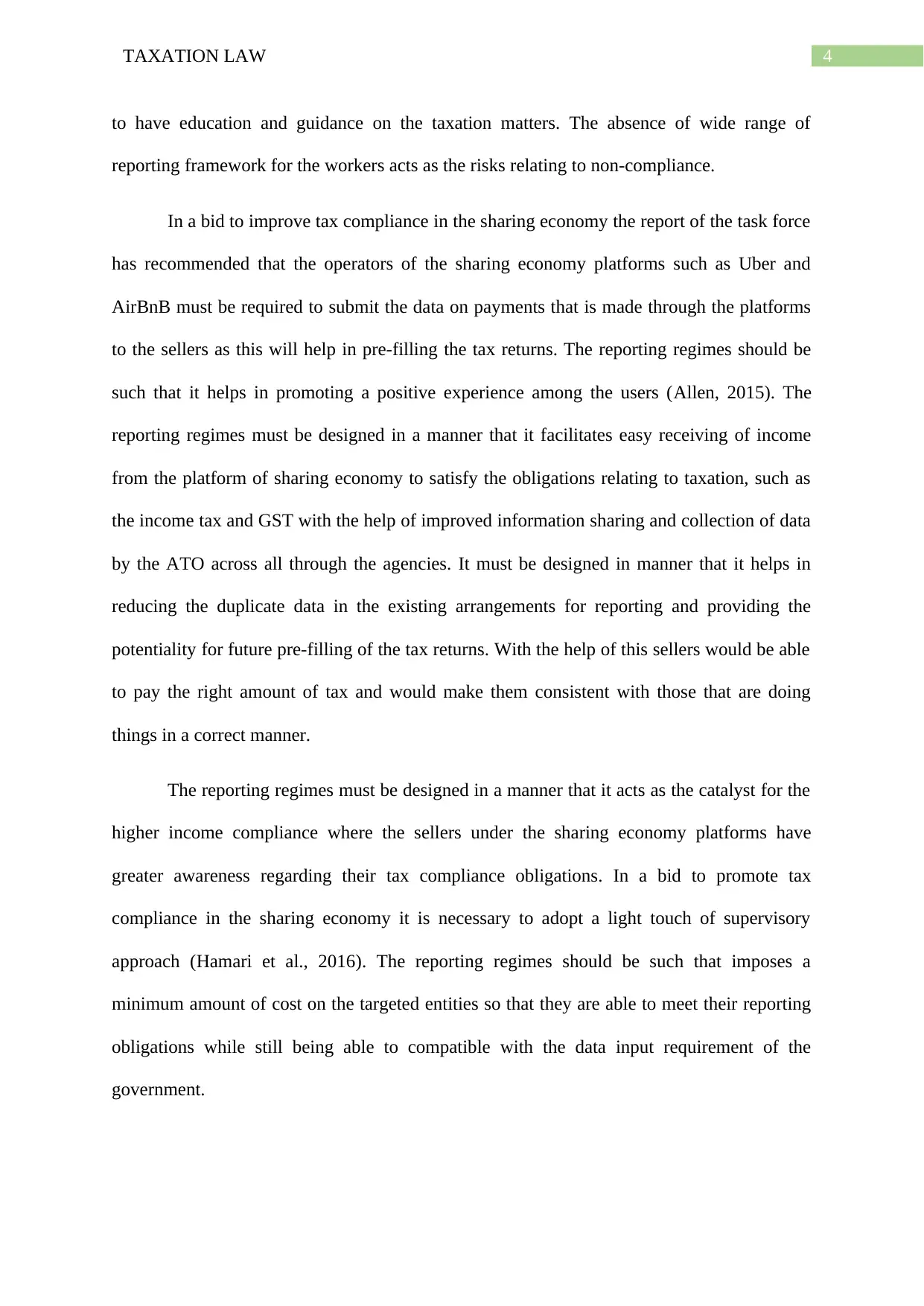
4TAXATION LAW
to have education and guidance on the taxation matters. The absence of wide range of
reporting framework for the workers acts as the risks relating to non-compliance.
In a bid to improve tax compliance in the sharing economy the report of the task force
has recommended that the operators of the sharing economy platforms such as Uber and
AirBnB must be required to submit the data on payments that is made through the platforms
to the sellers as this will help in pre-filling the tax returns. The reporting regimes should be
such that it helps in promoting a positive experience among the users (Allen, 2015). The
reporting regimes must be designed in a manner that it facilitates easy receiving of income
from the platform of sharing economy to satisfy the obligations relating to taxation, such as
the income tax and GST with the help of improved information sharing and collection of data
by the ATO across all through the agencies. It must be designed in manner that it helps in
reducing the duplicate data in the existing arrangements for reporting and providing the
potentiality for future pre-filling of the tax returns. With the help of this sellers would be able
to pay the right amount of tax and would make them consistent with those that are doing
things in a correct manner.
The reporting regimes must be designed in a manner that it acts as the catalyst for the
higher income compliance where the sellers under the sharing economy platforms have
greater awareness regarding their tax compliance obligations. In a bid to promote tax
compliance in the sharing economy it is necessary to adopt a light touch of supervisory
approach (Hamari et al., 2016). The reporting regimes should be such that imposes a
minimum amount of cost on the targeted entities so that they are able to meet their reporting
obligations while still being able to compatible with the data input requirement of the
government.
to have education and guidance on the taxation matters. The absence of wide range of
reporting framework for the workers acts as the risks relating to non-compliance.
In a bid to improve tax compliance in the sharing economy the report of the task force
has recommended that the operators of the sharing economy platforms such as Uber and
AirBnB must be required to submit the data on payments that is made through the platforms
to the sellers as this will help in pre-filling the tax returns. The reporting regimes should be
such that it helps in promoting a positive experience among the users (Allen, 2015). The
reporting regimes must be designed in a manner that it facilitates easy receiving of income
from the platform of sharing economy to satisfy the obligations relating to taxation, such as
the income tax and GST with the help of improved information sharing and collection of data
by the ATO across all through the agencies. It must be designed in manner that it helps in
reducing the duplicate data in the existing arrangements for reporting and providing the
potentiality for future pre-filling of the tax returns. With the help of this sellers would be able
to pay the right amount of tax and would make them consistent with those that are doing
things in a correct manner.
The reporting regimes must be designed in a manner that it acts as the catalyst for the
higher income compliance where the sellers under the sharing economy platforms have
greater awareness regarding their tax compliance obligations. In a bid to promote tax
compliance in the sharing economy it is necessary to adopt a light touch of supervisory
approach (Hamari et al., 2016). The reporting regimes should be such that imposes a
minimum amount of cost on the targeted entities so that they are able to meet their reporting
obligations while still being able to compatible with the data input requirement of the
government.
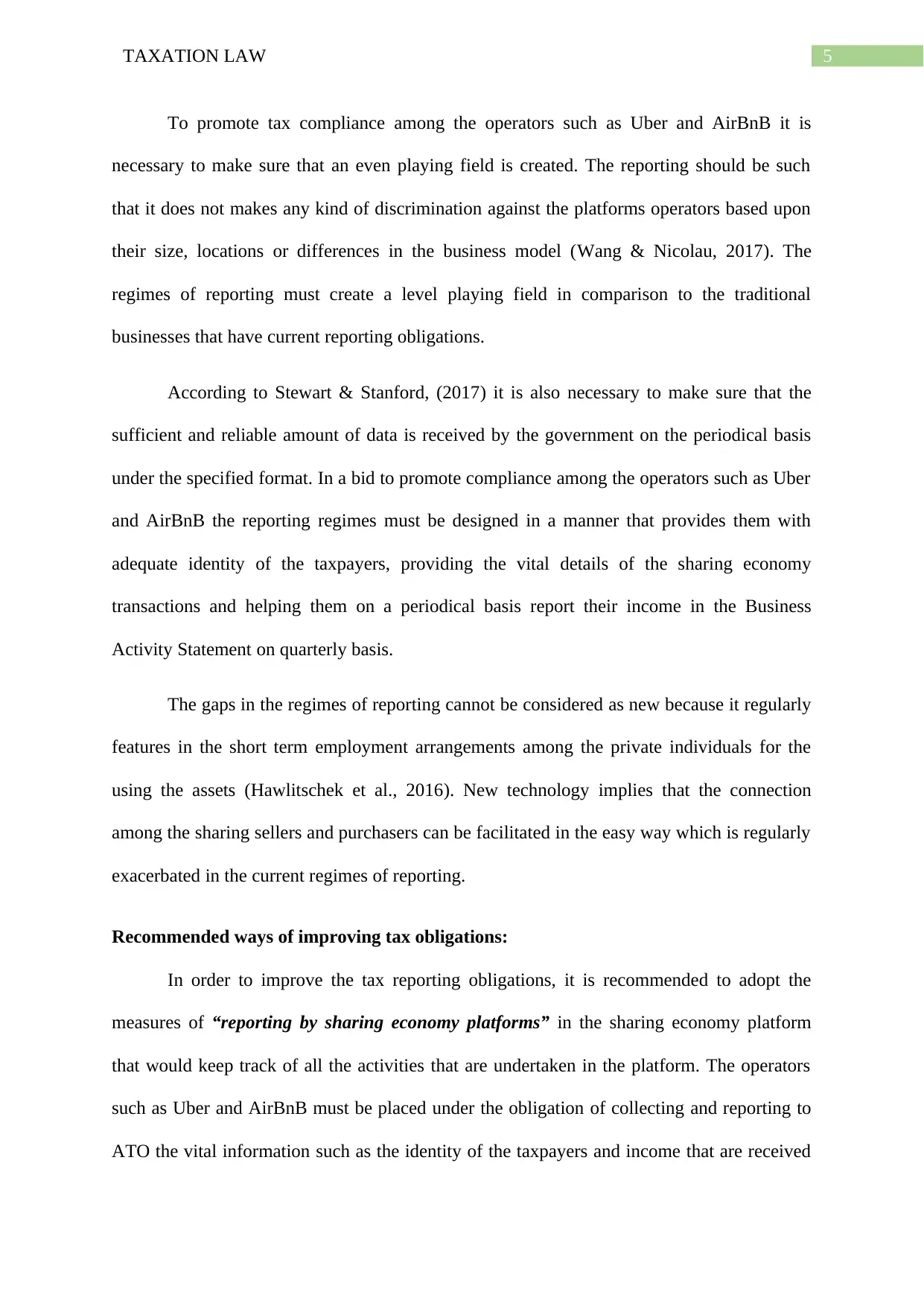
5TAXATION LAW
To promote tax compliance among the operators such as Uber and AirBnB it is
necessary to make sure that an even playing field is created. The reporting should be such
that it does not makes any kind of discrimination against the platforms operators based upon
their size, locations or differences in the business model (Wang & Nicolau, 2017). The
regimes of reporting must create a level playing field in comparison to the traditional
businesses that have current reporting obligations.
According to Stewart & Stanford, (2017) it is also necessary to make sure that the
sufficient and reliable amount of data is received by the government on the periodical basis
under the specified format. In a bid to promote compliance among the operators such as Uber
and AirBnB the reporting regimes must be designed in a manner that provides them with
adequate identity of the taxpayers, providing the vital details of the sharing economy
transactions and helping them on a periodical basis report their income in the Business
Activity Statement on quarterly basis.
The gaps in the regimes of reporting cannot be considered as new because it regularly
features in the short term employment arrangements among the private individuals for the
using the assets (Hawlitschek et al., 2016). New technology implies that the connection
among the sharing sellers and purchasers can be facilitated in the easy way which is regularly
exacerbated in the current regimes of reporting.
Recommended ways of improving tax obligations:
In order to improve the tax reporting obligations, it is recommended to adopt the
measures of “reporting by sharing economy platforms” in the sharing economy platform
that would keep track of all the activities that are undertaken in the platform. The operators
such as Uber and AirBnB must be placed under the obligation of collecting and reporting to
ATO the vital information such as the identity of the taxpayers and income that are received
To promote tax compliance among the operators such as Uber and AirBnB it is
necessary to make sure that an even playing field is created. The reporting should be such
that it does not makes any kind of discrimination against the platforms operators based upon
their size, locations or differences in the business model (Wang & Nicolau, 2017). The
regimes of reporting must create a level playing field in comparison to the traditional
businesses that have current reporting obligations.
According to Stewart & Stanford, (2017) it is also necessary to make sure that the
sufficient and reliable amount of data is received by the government on the periodical basis
under the specified format. In a bid to promote compliance among the operators such as Uber
and AirBnB the reporting regimes must be designed in a manner that provides them with
adequate identity of the taxpayers, providing the vital details of the sharing economy
transactions and helping them on a periodical basis report their income in the Business
Activity Statement on quarterly basis.
The gaps in the regimes of reporting cannot be considered as new because it regularly
features in the short term employment arrangements among the private individuals for the
using the assets (Hawlitschek et al., 2016). New technology implies that the connection
among the sharing sellers and purchasers can be facilitated in the easy way which is regularly
exacerbated in the current regimes of reporting.
Recommended ways of improving tax obligations:
In order to improve the tax reporting obligations, it is recommended to adopt the
measures of “reporting by sharing economy platforms” in the sharing economy platform
that would keep track of all the activities that are undertaken in the platform. The operators
such as Uber and AirBnB must be placed under the obligation of collecting and reporting to
ATO the vital information such as the identity of the taxpayers and income that are received
⊘ This is a preview!⊘
Do you want full access?
Subscribe today to unlock all pages.

Trusted by 1+ million students worldwide
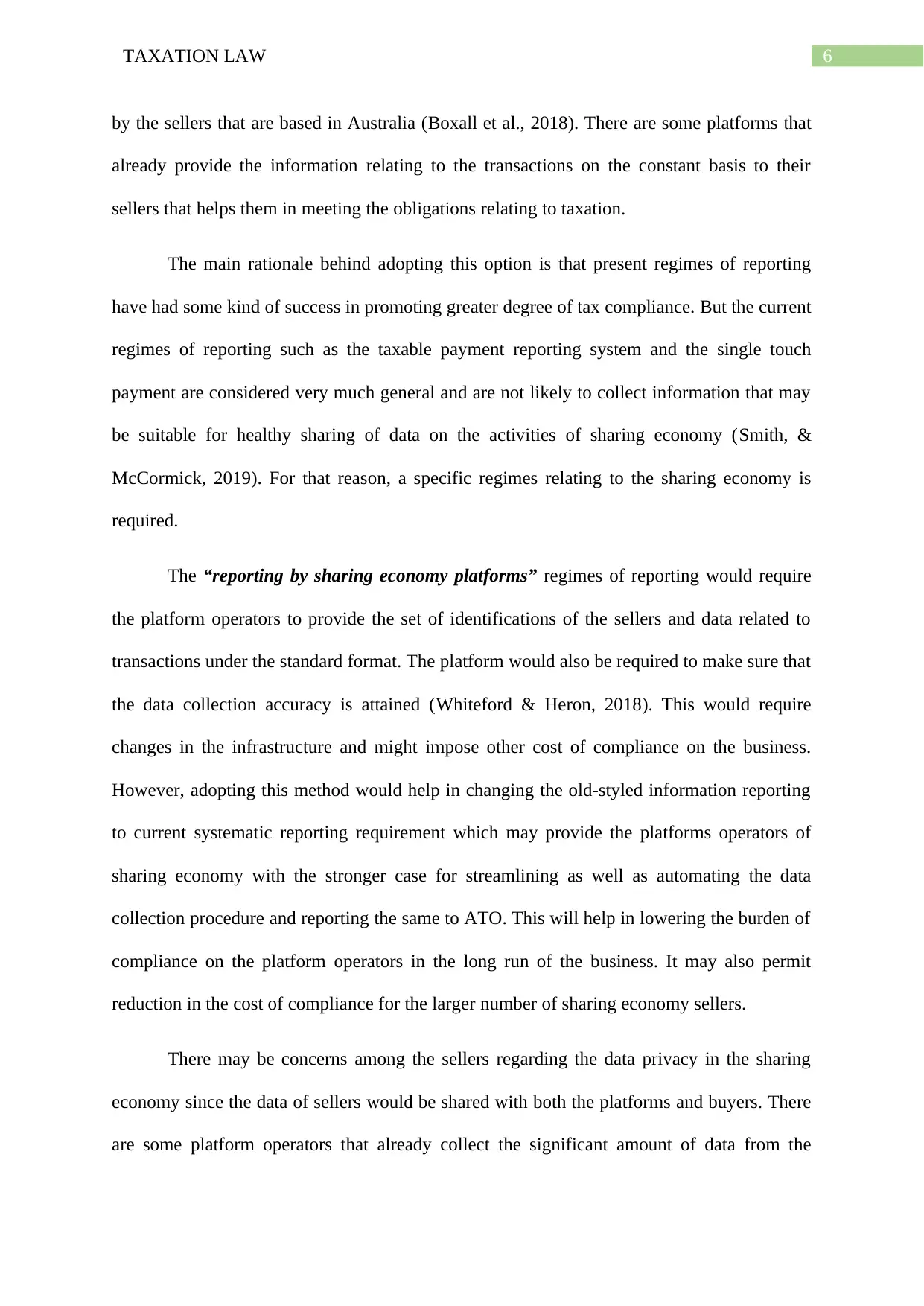
6TAXATION LAW
by the sellers that are based in Australia (Boxall et al., 2018). There are some platforms that
already provide the information relating to the transactions on the constant basis to their
sellers that helps them in meeting the obligations relating to taxation.
The main rationale behind adopting this option is that present regimes of reporting
have had some kind of success in promoting greater degree of tax compliance. But the current
regimes of reporting such as the taxable payment reporting system and the single touch
payment are considered very much general and are not likely to collect information that may
be suitable for healthy sharing of data on the activities of sharing economy (Smith, &
McCormick, 2019). For that reason, a specific regimes relating to the sharing economy is
required.
The “reporting by sharing economy platforms” regimes of reporting would require
the platform operators to provide the set of identifications of the sellers and data related to
transactions under the standard format. The platform would also be required to make sure that
the data collection accuracy is attained (Whiteford & Heron, 2018). This would require
changes in the infrastructure and might impose other cost of compliance on the business.
However, adopting this method would help in changing the old-styled information reporting
to current systematic reporting requirement which may provide the platforms operators of
sharing economy with the stronger case for streamlining as well as automating the data
collection procedure and reporting the same to ATO. This will help in lowering the burden of
compliance on the platform operators in the long run of the business. It may also permit
reduction in the cost of compliance for the larger number of sharing economy sellers.
There may be concerns among the sellers regarding the data privacy in the sharing
economy since the data of sellers would be shared with both the platforms and buyers. There
are some platform operators that already collect the significant amount of data from the
by the sellers that are based in Australia (Boxall et al., 2018). There are some platforms that
already provide the information relating to the transactions on the constant basis to their
sellers that helps them in meeting the obligations relating to taxation.
The main rationale behind adopting this option is that present regimes of reporting
have had some kind of success in promoting greater degree of tax compliance. But the current
regimes of reporting such as the taxable payment reporting system and the single touch
payment are considered very much general and are not likely to collect information that may
be suitable for healthy sharing of data on the activities of sharing economy (Smith, &
McCormick, 2019). For that reason, a specific regimes relating to the sharing economy is
required.
The “reporting by sharing economy platforms” regimes of reporting would require
the platform operators to provide the set of identifications of the sellers and data related to
transactions under the standard format. The platform would also be required to make sure that
the data collection accuracy is attained (Whiteford & Heron, 2018). This would require
changes in the infrastructure and might impose other cost of compliance on the business.
However, adopting this method would help in changing the old-styled information reporting
to current systematic reporting requirement which may provide the platforms operators of
sharing economy with the stronger case for streamlining as well as automating the data
collection procedure and reporting the same to ATO. This will help in lowering the burden of
compliance on the platform operators in the long run of the business. It may also permit
reduction in the cost of compliance for the larger number of sharing economy sellers.
There may be concerns among the sellers regarding the data privacy in the sharing
economy since the data of sellers would be shared with both the platforms and buyers. There
are some platform operators that already collect the significant amount of data from the
Paraphrase This Document
Need a fresh take? Get an instant paraphrase of this document with our AI Paraphraser
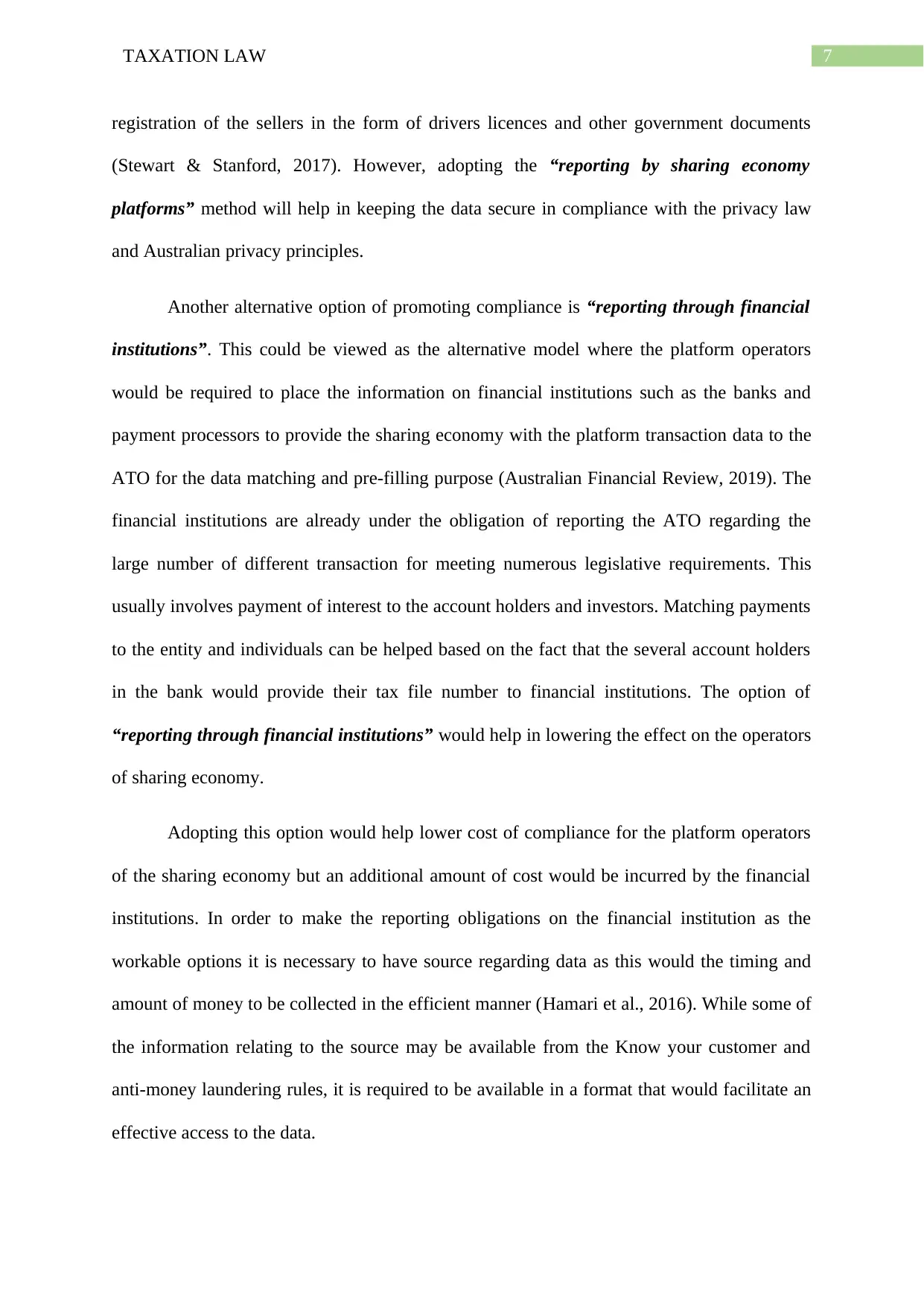
7TAXATION LAW
registration of the sellers in the form of drivers licences and other government documents
(Stewart & Stanford, 2017). However, adopting the “reporting by sharing economy
platforms” method will help in keeping the data secure in compliance with the privacy law
and Australian privacy principles.
Another alternative option of promoting compliance is “reporting through financial
institutions”. This could be viewed as the alternative model where the platform operators
would be required to place the information on financial institutions such as the banks and
payment processors to provide the sharing economy with the platform transaction data to the
ATO for the data matching and pre-filling purpose (Australian Financial Review, 2019). The
financial institutions are already under the obligation of reporting the ATO regarding the
large number of different transaction for meeting numerous legislative requirements. This
usually involves payment of interest to the account holders and investors. Matching payments
to the entity and individuals can be helped based on the fact that the several account holders
in the bank would provide their tax file number to financial institutions. The option of
“reporting through financial institutions” would help in lowering the effect on the operators
of sharing economy.
Adopting this option would help lower cost of compliance for the platform operators
of the sharing economy but an additional amount of cost would be incurred by the financial
institutions. In order to make the reporting obligations on the financial institution as the
workable options it is necessary to have source regarding data as this would the timing and
amount of money to be collected in the efficient manner (Hamari et al., 2016). While some of
the information relating to the source may be available from the Know your customer and
anti-money laundering rules, it is required to be available in a format that would facilitate an
effective access to the data.
registration of the sellers in the form of drivers licences and other government documents
(Stewart & Stanford, 2017). However, adopting the “reporting by sharing economy
platforms” method will help in keeping the data secure in compliance with the privacy law
and Australian privacy principles.
Another alternative option of promoting compliance is “reporting through financial
institutions”. This could be viewed as the alternative model where the platform operators
would be required to place the information on financial institutions such as the banks and
payment processors to provide the sharing economy with the platform transaction data to the
ATO for the data matching and pre-filling purpose (Australian Financial Review, 2019). The
financial institutions are already under the obligation of reporting the ATO regarding the
large number of different transaction for meeting numerous legislative requirements. This
usually involves payment of interest to the account holders and investors. Matching payments
to the entity and individuals can be helped based on the fact that the several account holders
in the bank would provide their tax file number to financial institutions. The option of
“reporting through financial institutions” would help in lowering the effect on the operators
of sharing economy.
Adopting this option would help lower cost of compliance for the platform operators
of the sharing economy but an additional amount of cost would be incurred by the financial
institutions. In order to make the reporting obligations on the financial institution as the
workable options it is necessary to have source regarding data as this would the timing and
amount of money to be collected in the efficient manner (Hamari et al., 2016). While some of
the information relating to the source may be available from the Know your customer and
anti-money laundering rules, it is required to be available in a format that would facilitate an
effective access to the data.
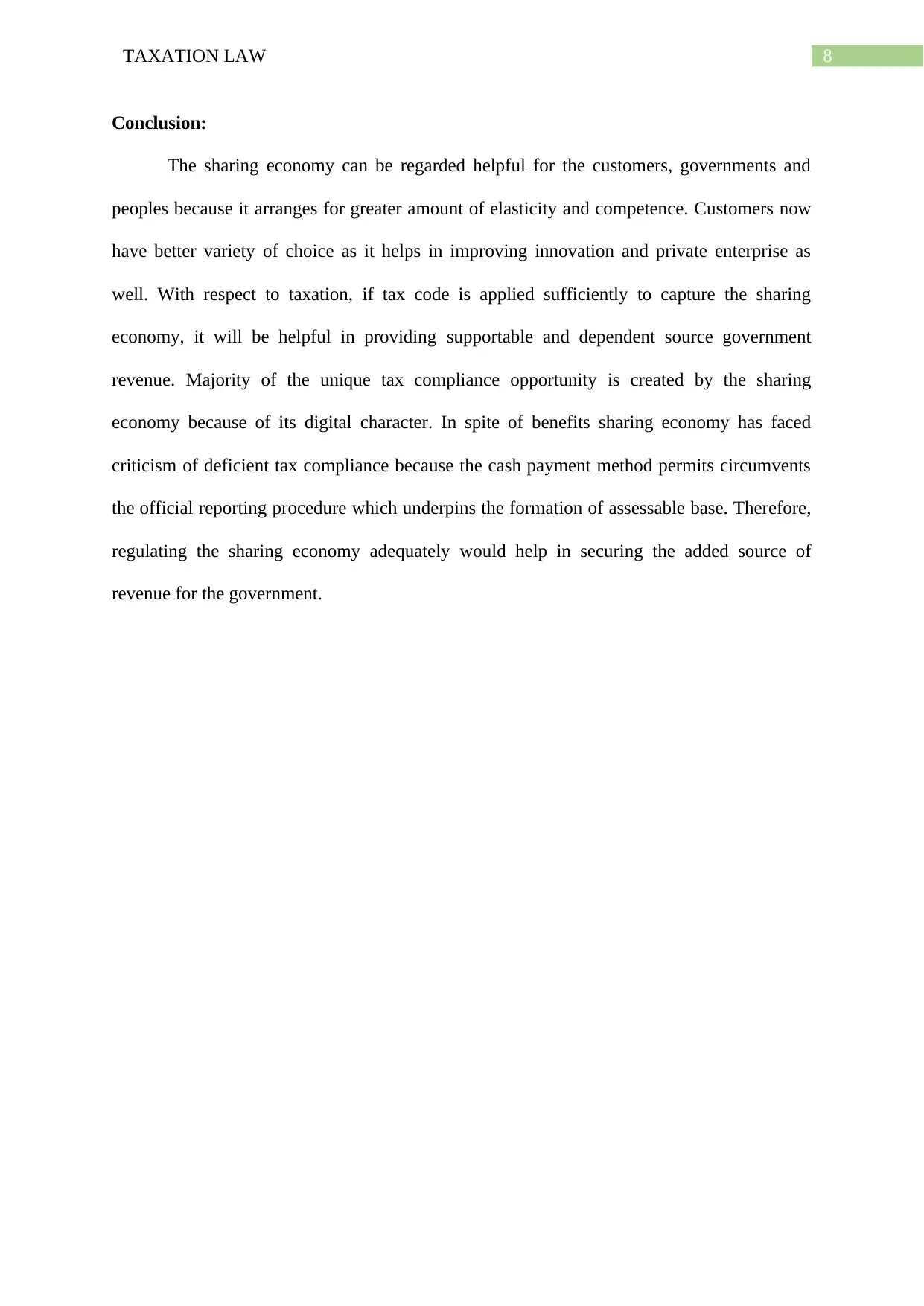
8TAXATION LAW
Conclusion:
The sharing economy can be regarded helpful for the customers, governments and
peoples because it arranges for greater amount of elasticity and competence. Customers now
have better variety of choice as it helps in improving innovation and private enterprise as
well. With respect to taxation, if tax code is applied sufficiently to capture the sharing
economy, it will be helpful in providing supportable and dependent source government
revenue. Majority of the unique tax compliance opportunity is created by the sharing
economy because of its digital character. In spite of benefits sharing economy has faced
criticism of deficient tax compliance because the cash payment method permits circumvents
the official reporting procedure which underpins the formation of assessable base. Therefore,
regulating the sharing economy adequately would help in securing the added source of
revenue for the government.
Conclusion:
The sharing economy can be regarded helpful for the customers, governments and
peoples because it arranges for greater amount of elasticity and competence. Customers now
have better variety of choice as it helps in improving innovation and private enterprise as
well. With respect to taxation, if tax code is applied sufficiently to capture the sharing
economy, it will be helpful in providing supportable and dependent source government
revenue. Majority of the unique tax compliance opportunity is created by the sharing
economy because of its digital character. In spite of benefits sharing economy has faced
criticism of deficient tax compliance because the cash payment method permits circumvents
the official reporting procedure which underpins the formation of assessable base. Therefore,
regulating the sharing economy adequately would help in securing the added source of
revenue for the government.
⊘ This is a preview!⊘
Do you want full access?
Subscribe today to unlock all pages.

Trusted by 1+ million students worldwide
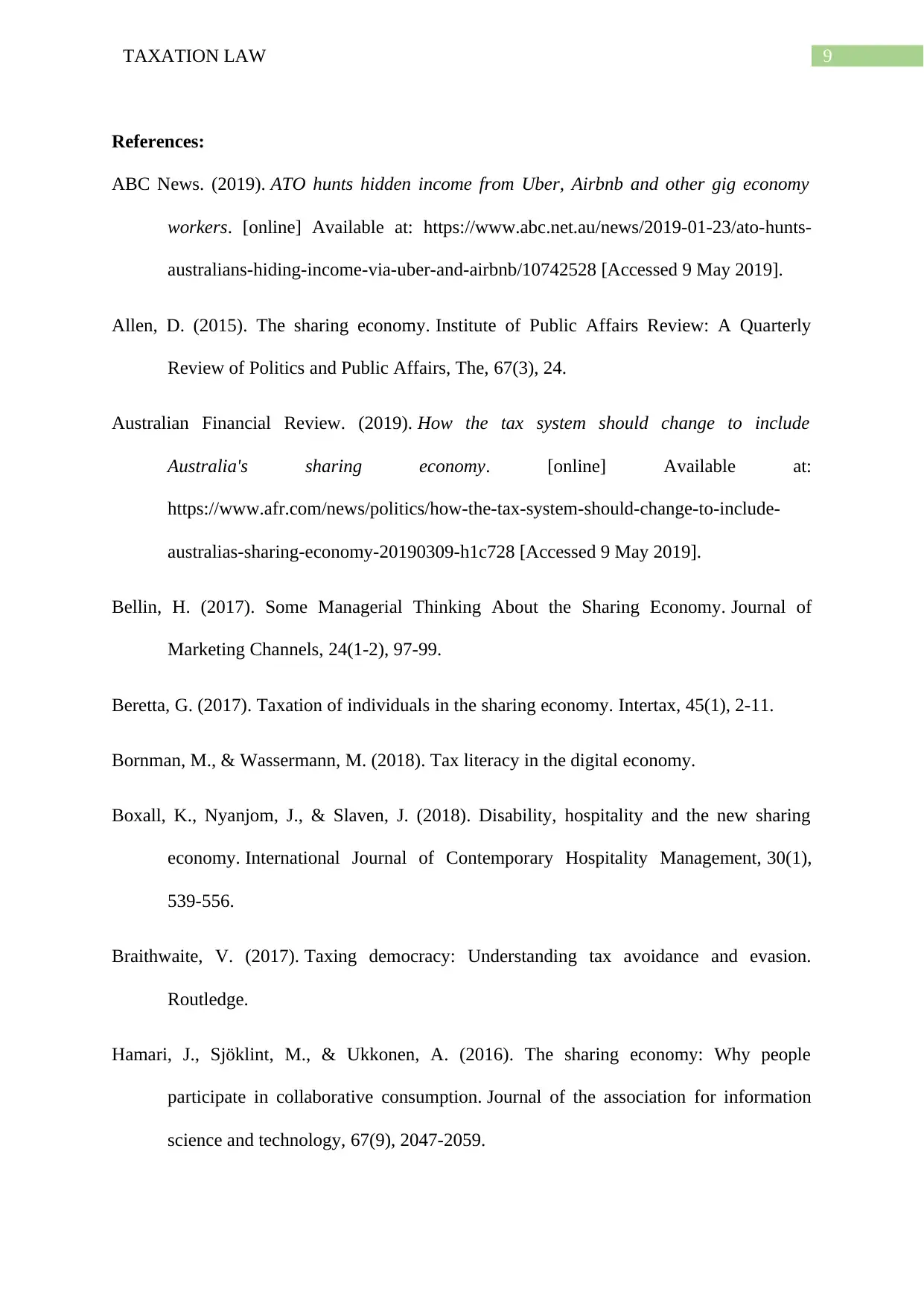
9TAXATION LAW
References:
ABC News. (2019). ATO hunts hidden income from Uber, Airbnb and other gig economy
workers. [online] Available at: https://www.abc.net.au/news/2019-01-23/ato-hunts-
australians-hiding-income-via-uber-and-airbnb/10742528 [Accessed 9 May 2019].
Allen, D. (2015). The sharing economy. Institute of Public Affairs Review: A Quarterly
Review of Politics and Public Affairs, The, 67(3), 24.
Australian Financial Review. (2019). How the tax system should change to include
Australia's sharing economy. [online] Available at:
https://www.afr.com/news/politics/how-the-tax-system-should-change-to-include-
australias-sharing-economy-20190309-h1c728 [Accessed 9 May 2019].
Bellin, H. (2017). Some Managerial Thinking About the Sharing Economy. Journal of
Marketing Channels, 24(1-2), 97-99.
Beretta, G. (2017). Taxation of individuals in the sharing economy. Intertax, 45(1), 2-11.
Bornman, M., & Wassermann, M. (2018). Tax literacy in the digital economy.
Boxall, K., Nyanjom, J., & Slaven, J. (2018). Disability, hospitality and the new sharing
economy. International Journal of Contemporary Hospitality Management, 30(1),
539-556.
Braithwaite, V. (2017). Taxing democracy: Understanding tax avoidance and evasion.
Routledge.
Hamari, J., Sjöklint, M., & Ukkonen, A. (2016). The sharing economy: Why people
participate in collaborative consumption. Journal of the association for information
science and technology, 67(9), 2047-2059.
References:
ABC News. (2019). ATO hunts hidden income from Uber, Airbnb and other gig economy
workers. [online] Available at: https://www.abc.net.au/news/2019-01-23/ato-hunts-
australians-hiding-income-via-uber-and-airbnb/10742528 [Accessed 9 May 2019].
Allen, D. (2015). The sharing economy. Institute of Public Affairs Review: A Quarterly
Review of Politics and Public Affairs, The, 67(3), 24.
Australian Financial Review. (2019). How the tax system should change to include
Australia's sharing economy. [online] Available at:
https://www.afr.com/news/politics/how-the-tax-system-should-change-to-include-
australias-sharing-economy-20190309-h1c728 [Accessed 9 May 2019].
Bellin, H. (2017). Some Managerial Thinking About the Sharing Economy. Journal of
Marketing Channels, 24(1-2), 97-99.
Beretta, G. (2017). Taxation of individuals in the sharing economy. Intertax, 45(1), 2-11.
Bornman, M., & Wassermann, M. (2018). Tax literacy in the digital economy.
Boxall, K., Nyanjom, J., & Slaven, J. (2018). Disability, hospitality and the new sharing
economy. International Journal of Contemporary Hospitality Management, 30(1),
539-556.
Braithwaite, V. (2017). Taxing democracy: Understanding tax avoidance and evasion.
Routledge.
Hamari, J., Sjöklint, M., & Ukkonen, A. (2016). The sharing economy: Why people
participate in collaborative consumption. Journal of the association for information
science and technology, 67(9), 2047-2059.
Paraphrase This Document
Need a fresh take? Get an instant paraphrase of this document with our AI Paraphraser
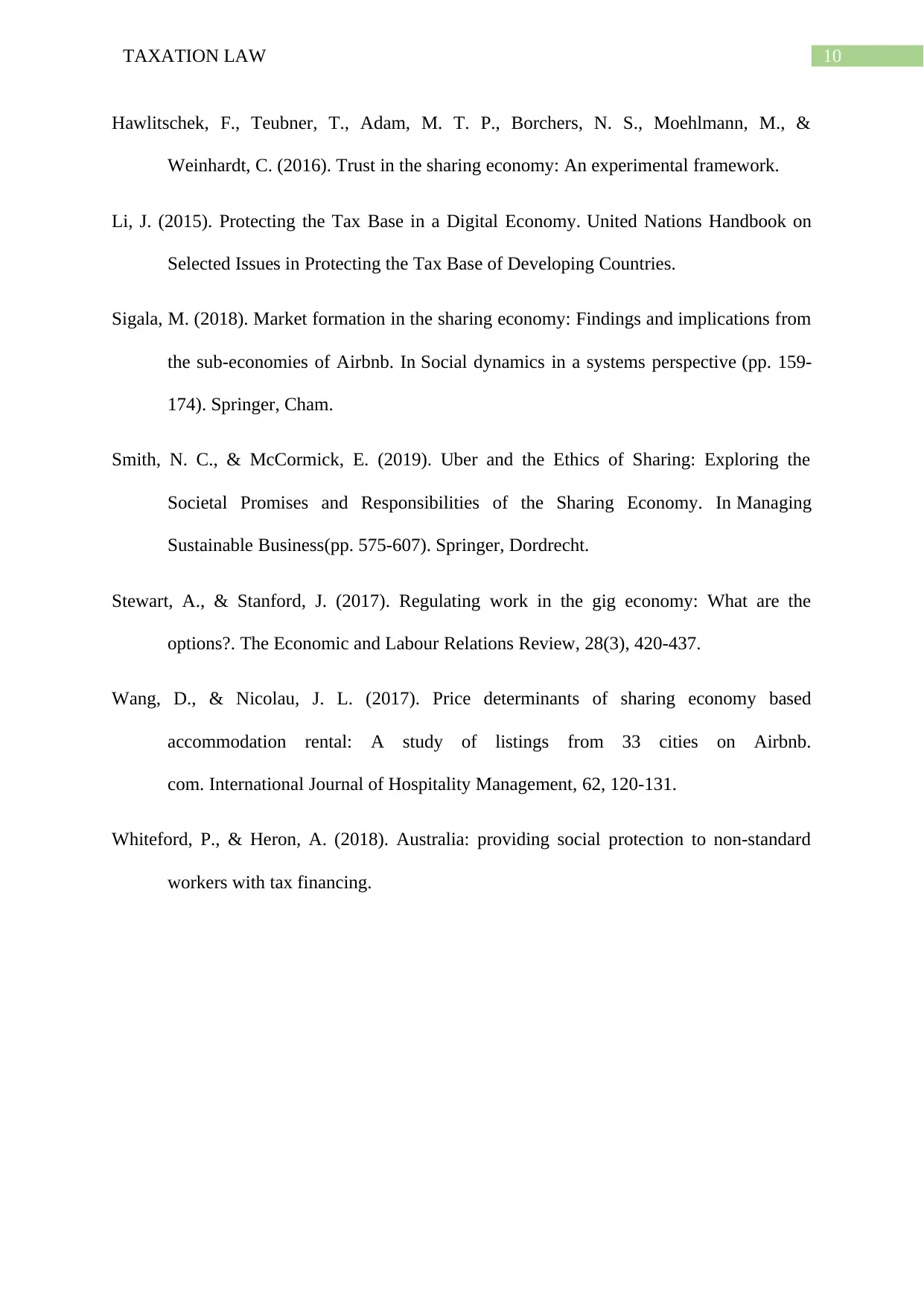
10TAXATION LAW
Hawlitschek, F., Teubner, T., Adam, M. T. P., Borchers, N. S., Moehlmann, M., &
Weinhardt, C. (2016). Trust in the sharing economy: An experimental framework.
Li, J. (2015). Protecting the Tax Base in a Digital Economy. United Nations Handbook on
Selected Issues in Protecting the Tax Base of Developing Countries.
Sigala, M. (2018). Market formation in the sharing economy: Findings and implications from
the sub-economies of Airbnb. In Social dynamics in a systems perspective (pp. 159-
174). Springer, Cham.
Smith, N. C., & McCormick, E. (2019). Uber and the Ethics of Sharing: Exploring the
Societal Promises and Responsibilities of the Sharing Economy. In Managing
Sustainable Business(pp. 575-607). Springer, Dordrecht.
Stewart, A., & Stanford, J. (2017). Regulating work in the gig economy: What are the
options?. The Economic and Labour Relations Review, 28(3), 420-437.
Wang, D., & Nicolau, J. L. (2017). Price determinants of sharing economy based
accommodation rental: A study of listings from 33 cities on Airbnb.
com. International Journal of Hospitality Management, 62, 120-131.
Whiteford, P., & Heron, A. (2018). Australia: providing social protection to non-standard
workers with tax financing.
Hawlitschek, F., Teubner, T., Adam, M. T. P., Borchers, N. S., Moehlmann, M., &
Weinhardt, C. (2016). Trust in the sharing economy: An experimental framework.
Li, J. (2015). Protecting the Tax Base in a Digital Economy. United Nations Handbook on
Selected Issues in Protecting the Tax Base of Developing Countries.
Sigala, M. (2018). Market formation in the sharing economy: Findings and implications from
the sub-economies of Airbnb. In Social dynamics in a systems perspective (pp. 159-
174). Springer, Cham.
Smith, N. C., & McCormick, E. (2019). Uber and the Ethics of Sharing: Exploring the
Societal Promises and Responsibilities of the Sharing Economy. In Managing
Sustainable Business(pp. 575-607). Springer, Dordrecht.
Stewart, A., & Stanford, J. (2017). Regulating work in the gig economy: What are the
options?. The Economic and Labour Relations Review, 28(3), 420-437.
Wang, D., & Nicolau, J. L. (2017). Price determinants of sharing economy based
accommodation rental: A study of listings from 33 cities on Airbnb.
com. International Journal of Hospitality Management, 62, 120-131.
Whiteford, P., & Heron, A. (2018). Australia: providing social protection to non-standard
workers with tax financing.
1 out of 11
Related Documents
Your All-in-One AI-Powered Toolkit for Academic Success.
+13062052269
info@desklib.com
Available 24*7 on WhatsApp / Email
![[object Object]](/_next/static/media/star-bottom.7253800d.svg)
Unlock your academic potential
Copyright © 2020–2026 A2Z Services. All Rights Reserved. Developed and managed by ZUCOL.





